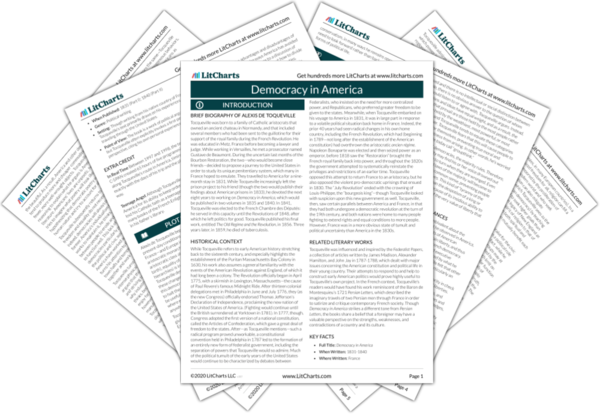One of Tocqueville’s major conclusions about American life is that Americans are particularly fond of grouping themselves into all kinds of associations based on different opinions and beliefs, from small temperance societies to religious communities and large political parties. Like the checks and balances within the political system, Tocqueville sees these institutions (which lie outside the official workings of the American government) as a possible means of mitigating the tyranny of the majority and the dangers of individualism. However, Tocqueville also maintains a somewhat ambivalent view about a number of these institutions, given what he sees as the very real possibility that they might gain too much power for themselves.
Tocqueville’s discussions of political parties and other associations that lobby for political change is one example of his ambivalence. The two major American parties of the time were the Federalists (who preferred more centralized power) and Republicans (who preferred less intrusion by government). Tocqueville warns that the increasing hegemony of the Republican political perspective could cause public interest to be diverted elsewhere—since, if most people agreed on important questions, they might grow occupied with arguments about insignificant features of society while failing to question the majority consensus. Still, he admires the tendency to take advantage of any excuse to gather an assembly together, whether it’s building a new school, painting a new sign, or protesting a law—though he considers this a peculiarly American characteristic rather than one that could be easily replicated in France.
Tocqueville also praises the ways in which religious institutions have remained separate from political ones in America, thus allowing religion to claim a moral authority unsullied by political involvement (unlike, he notes, in many European countries). In a democracy that has embraced freedom for all, religion can fill a void for people who feel unmoored by the proliferation of possible ways to live in the modern world and who seek instruction and guidance. Religion can also mitigate individualism and materialism (which Tocqueville sees as the two major dangers facing American democracy) by teaching citizens to care for each other and to seek higher goals than wealth. He characterizes the Puritan legacy of New England as particularly influential in joining the spirit of religion to that of liberty, given the Puritans’ emphasis on both spiritual and political well-being, and the ways the two mutually benefit each other.
Tocqueville reserves perhaps his greatest praise for the civic institution of the press, which he argues plays a political role just as significant as that of a political party. In fact, while he acknowledges that political parties and other groups may at times grow so powerful that they need to be limited by the government, he argues that there should be no such limit on the liberty of the press. Newspapers perform a similar function to local government, spreading the interests and ideals of American life to every corner of the country. While people might be swayed by one newspaper’s claim of objective truth, there are so many newspapers, pamphlets, and journals in the United States that no one paper claims the allegiance of all. The pervasiveness and power of the press in general thus, paradoxically, makes individual media outlets less powerful, as so many voices counter each other and balance each other out. This means, for Tocqueville, that the press is not in danger of becoming tyrannical.
The proliferation of newspapers is another element of American democracy that Tocqueville contrasts to French society, whose Paris-centric journalistic practices are, he thinks, not nearly as powerful or beneficial as the American example. This mirrors Tocqueville’s more general belief that French centralization of government precludes the possibility of robust civic institutions. To Tocqueville, a democracy in which many different voices are in conversation and in which power is diffused across broad groups of people and places is more stable and free.
Civic and Religious Institutions ThemeTracker

Civic and Religious Institutions Quotes in Democracy in America
The only nations which deny the utility of provincial liberties are those which have fewest of them; in other words, those only censure the institution who do not know it.

Unlock explanations and citation info for this and every other Democracy in America quote.
Plus so much more...
Get LitCharts A+Nothing, in my opinion, is more deserving of our attention than the intellectual and moral associations of America. […] If men are to remain civilized, or to become so, the art of associating together must grow and improve in the same ratio in which the equality of conditions is increased.
I am of opinion, that, in the democratic ages which are opening upon us, individual independence and local liberties will ever be the products of art; that centralization will be the natural government.











